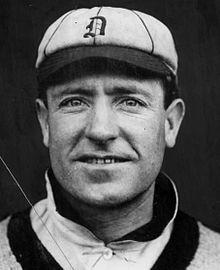Charley O'Leary
American baseball player and coach (1875–1941) From Wikipedia, the free encyclopedia
Charles Timothy O'Leary (October 15, 1875 – January 6, 1941) was an American professional baseball shortstop who played eleven seasons with the Detroit Tigers (1904–1912), St. Louis Cardinals (1913), and St. Louis Browns (1934) of Major League Baseball (MLB).[1]
This article needs additional citations for verification. (April 2016) |
| Charley O'Leary | |
|---|---|
 O'Leary with the Detroit Tigers | |
| Shortstop | |
| Born: October 15, 1875 Chicago, Illinois, U.S. | |
| Died: January 6, 1941 (aged 65) Chicago, Illinois, U.S. | |
Batted: Right Threw: Right | |
| MLB debut | |
| April 14, 1904, for the Detroit Tigers | |
| Last MLB appearance | |
| September 30, 1934, for the St. Louis Browns | |
| MLB statistics | |
| Batting average | .226 |
| Home runs | 3 |
| Runs batted in | 213 |
| Teams | |
| As a player
As a coach | |
| Career highlights and awards | |
| |
Early life
Born in Chicago, Illinois to Irish immigrants Timothy and Ellen O’Leary,[2] who had 16 children (11 boys). O'Leary worked at age 16 for a clothing company and played on the company's semi-pro baseball team.[citation needed] In 1900, while working as a messenger boy, he was sent to the ballpark of the Chicago White Stockings; when their shortstop, Frank Shugart, was injured, O'Leary was recruited on the spot, based on the recommendation of someone who knew him.[3] His talent as a middle infielder and scrappy hitter came to the attention of Charles Comiskey, owner of the White Stockings (later the Chicago White Sox). Though there is no independent verification, O'Leary reportedly signed briefly with the team,[4] only to have his arm broken from a pitched ball thrown by 'fireballer' and Hall of Famer Rube Waddell.[3]
Major leagues
Summarize
Perspective
O'Leary made his major league debut on April 14, 1904, with the Tigers. He was Detroit's starting shortstop from 1904 to 1907 and became a backup shortstop and utility infielder from 1908–1912.[1]
In the off-season, O'Leary and teammate Germany Schaefer, known as one of baseball's zaniest characters, worked as a comic vaudeville act.[5][6] The O'Leary-Schaefer vaudeville act is said to have inspired two Metro-Goldwyn-Mayer musicals: the forgotten 1930 film They Learned About Women and Busby Berkeley's last film, Take Me Out to the Ballgame (1949), with Gene Kelly and Frank Sinatra.[6]
Not known for his hitting, O'Leary had a career batting average of .226.[1]

After finishing his playing career in 1913 with the St. Louis Cardinals, O'Leary became a player-manager in the minor and semi-pro leagues for several years, including in San Francisco, St. Paul, San Antonio, and Chicago,[4] until he was offered a coaching job in 1920 by his close friend, Miller Huggins, manager of the New York Yankees.[7] After a 17–0 victory over the Washington Senators on July 6, 1920,[8] O'Leary was returning to New York in a car driven by Babe Ruth, along with Ruth's wife Helen, rookie outfielder Frank Gleich, and second-string catcher Fred Hofmann. Ruth lost control of the car, and O'Leary was ejected from the vehicle, although he suffered only minor injuries.[9][10] He then coached with the Yankees for 10 years, during which period they won six pennants and two World Series, including the great 1927 Yankees team.[4] O'Leary then coached with the Chicago Cubs under Rogers Hornsby, and with the St. Louis Browns.
On September 30, 1934, several weeks shy of his 59th birthday, O'Leary was brought out of retirement by the Browns. In a pinch-hitting appearance, he singled and subsequently scored, becoming both the oldest Major League Baseball player to collect a hit and score a run.[6]
He died from peritonitis in Chicago on January 6, 1941, and was buried at Mount Olivet Cemetery.[11]
Date of birth
During his career, O'Leary claimed to have been born in 1882. However, in 2010, a researcher for the Society for American Baseball Research found him in the 1880 census. His draft record for World War I, which showed that he was born in 1875, was subsequently located.[12] This made him the second-oldest Major League Baseball player to appear in a game, after Satchel Paige.
See also
References
External links
Wikiwand - on
Seamless Wikipedia browsing. On steroids.
